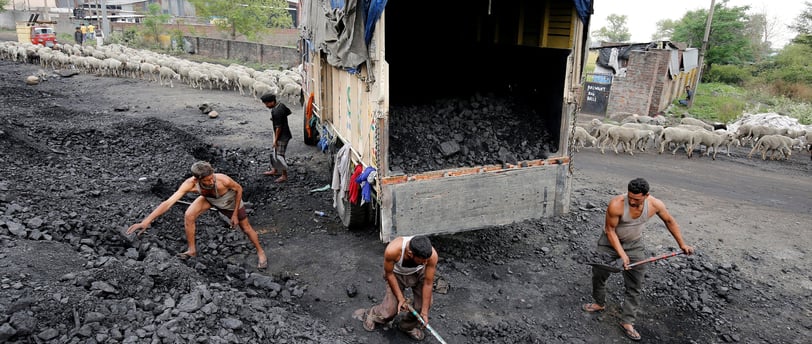Add your promotional text...
India’s Coal Imports Decline Amid Surge in Domestic Production: A Step Towards Energy Independence
Synopsis: India has recorded a 3.1% drop in coal imports for April-October FY 2024-25, driven by increased domestic coal production. This shift signals a move toward self-reliance in coal supply while reducing dependency on imports for critical industries and energy generation.
COMMODITIES
By Ekta Mani
12/19/20243 min read


India’s Coal Imports: A Turning Point in Energy Policy
India, despite being home to the fifth-largest coal reserves in the world, has historically faced challenges in meeting its coal demand due to shortages of specific types such as coking coal and high-grade thermal coal. However, recent data highlights a remarkable transformation in the country’s coal landscape.
Between April and October 2024, coal imports declined by 3.1%, dropping to 149.39 million tonnes (MT) from 154.17 MT during the same period in the previous fiscal year. This reduction is largely attributed to India’s enhanced domestic coal production capabilities.
Sector-Specific Trends: A Closer Look
Non-Regulated Sector Sees Significant Decline
Coal imports for the non-regulated sector, which includes industries other than power, experienced an even steeper decline of 8.8% compared to the previous year. This trend underscores the growing ability of domestic production to cater to industrial needs.
Thermal Power Plants Cut Blending Imports
Despite a 3.87% growth in coal-based power generation during April-October 2024 compared to the previous year, thermal power plants significantly reduced their reliance on imported coal for blending. Imports for this purpose dropped by 19.5%, highlighting India’s progress toward self-sufficiency in coal-based power generation.
Imported Coal-Based Power Plants Drive Import Growth
Interestingly, while imports for blending purposes declined, coal imports for plants designed exclusively for imported high-grade coal surged. Imports for such plants rose by 38.4%, reaching 30.04 MT during April-October 2024, up from 21.71 MT in the same period last year.
These plants, essential for meeting specific energy demands, continue to rely on imported coal due to their operational design.
Domestic Coal Production: A Growth Story
Domestic coal production witnessed a robust growth of 6.04%, increasing from 506.93 MT in April-October 2023 to 537.57 MT in the same period of FY 2024-25. This growth reflects the success of government-led initiatives aimed at ramping up coal output.
Government’s Strategic Measures for Energy Security
The Ministry of Coal has been at the forefront of implementing targeted strategies to bolster domestic coal production. These efforts aim to:
Reduce Import Dependency: By increasing domestic output, India seeks to minimize its reliance on imported coal, thereby saving valuable foreign exchange reserves.
Enhance Energy Security: Strengthening domestic coal availability ensures a stable energy supply for the nation.
Promote Sustainability: A focus on self-reliance aligns with broader sustainability goals, reducing the environmental impact of transporting coal from overseas.
Bridging the Gaps in Coal Supply
India’s coal production is constrained by its limited availability of high-grade thermal and coking coal, essential for industries like steel production and certain power plants. While imports remain necessary to fill these gaps, the government’s proactive approach is gradually reducing this dependency.
Implications for the Power and Industrial Sectors
Power Sector
The reduction in blending imports demonstrates the ability of domestic coal to meet the growing demands of coal-based power plants. However, imported coal remains indispensable for specific plants designed to use only high-grade imported coal.
Industrial Sector
For non-regulated sectors, the decline in imports signifies a pivotal shift toward utilizing domestically sourced coal, supported by enhanced production and streamlined logistics.
Future Outlook: A Path to Self-Sufficiency
India’s declining coal imports signal a positive trajectory toward achieving energy self-reliance. The government’s ongoing efforts to increase domestic production and optimize coal utilization are expected to:
Further reduce import dependency in the coming years.
Strengthen India’s energy infrastructure.
Contribute to economic and environmental sustainability.
With continued focus on strategic initiatives, India is well-positioned to transform its coal industry into a cornerstone of national energy security, fostering a future of reduced imports and greater self-reliance.
India’s journey toward energy independence is gaining momentum, and the latest coal import trends are a testament to the country’s commitment to a sustainable and self-sufficient energy future.
